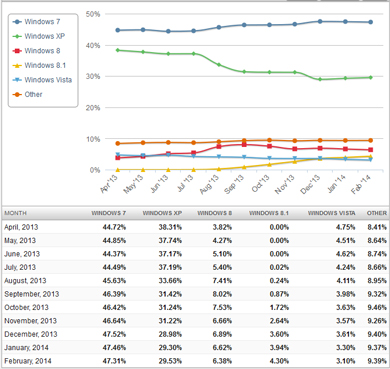News
Firefox Dumps Windows 8's 'Metro' UI Over Lack of Use
- By Kurt Mackie
- March 17, 2014
Mozilla, the company behind Firefox, will no longer support its browser for Windows 8, citing low usage rates.
Johnathan Nightingale, vice president of Mozilla Firefox, pointed to several interrelated reasons for dropping production in an announcement last week. First was the "flat" adoption rate for "Metro," Microsoft's original name for Windows 8's user interface before changing it to the "Windows Store Apps" UI. Second, there just were not enough Firefox Windows 8 Metro users to justify production of the browser.
The low number of testers would amount to too many bugs to fix in the final product, Nightingale contended.
"When I talk about the need to pick our battles, this [browser for Windows 8] feels like a bad one to pick: significant investment and low impact," Nightingale explained.
Windows 8 use for desktops peaked in September at 8.02 percent use, but it's been flat since November at the 6 percent-plus mark, according to Net Applications' trend data, which is complete through February. Windows 8.1 for desktops, released in October, is currently at the 3.1 percent use mark.
 [Click on image for larger view.]
Top desktop operating system shares, April 2013 to February 2014. (Source: Net Applications)
[Click on image for larger view.]
Top desktop operating system shares, April 2013 to February 2014. (Source: Net Applications)
Mozilla's move is a bit surprising because company officials early on had been quite vocal about overcoming the obstacles they faced in developing for Microsoft's new Windows 8 platform. No browser maker other than Microsoft could build for the Windows Store Apps side of Windows RT because Microsoft didn't provide access to any other browser except Internet Explorer, according to Mozilla and Google engineers. A Mozilla lawyer had described that situation as a potential antitrust issue.
Instead, third-party browser makers were restricted to creating what Microsoft termed "a Metro style enabled desktop browser." Such browsers could only run if they were made the default browser on x86/x64 systems running Windows 8.
"At first, it looked like we would be locked out completely," Nightingale wrote. "We eventually broke open Metro (though never the RT line of ARM-based products) and we got to work."
Now those Windows 8 efforts have ceased, although Mozilla is still keeping the code around in case the Windows 8 platform takes off.
Besides Internet Explorer for Windows 8, there are a couple of alternatives. Google's Chrome browser currently runs on Windows 8 systems if it's made the default browser. The machine needs to support hardware acceleration and the browser won't work at all on machines with high-resolution displays. Chrome on Windows 8 only supports plug-ins that use the Pepper API, according to Google's FAQ.
Opera Software's Opera 12.10 browser supports "Windows 8 Classic," according to a help page. However, the browser doesn't have support for all of Windows 8's touch gestures.
Related:
About the Author
Kurt Mackie is senior news producer for 1105 Media's Converge360 group.